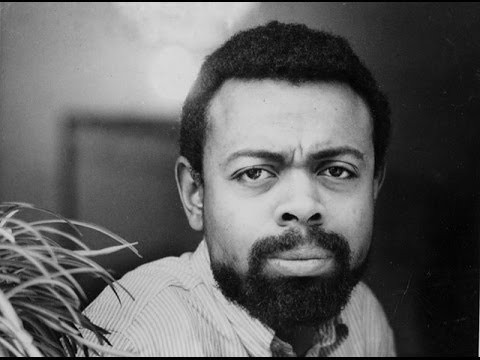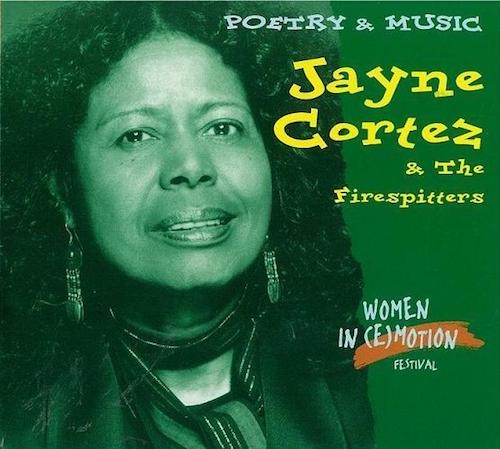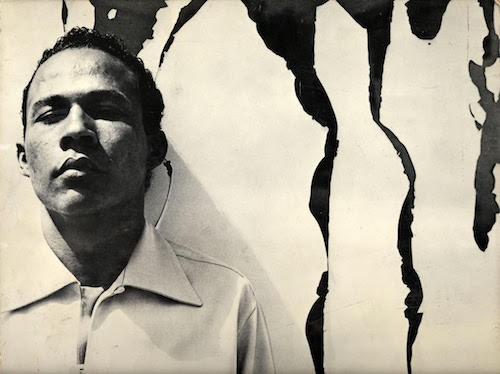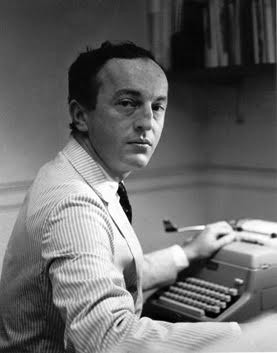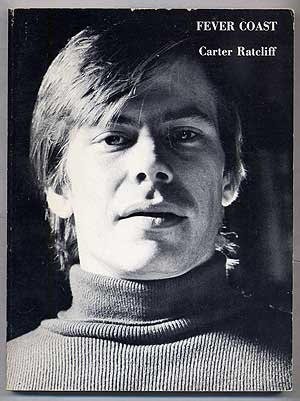
I am surrounded by books and anthologies of poetry. They give solace in dark times, fire up emboldened resistance, and provide delight in musical form. Here’s a selection of what I happen to have around at this moment.
I look down and see the book cover of NEW NEGRO POETS:USA. A starkly effective design, the words set off prominently in black in a bold san serif title font against a white band. Lower down, in a more delicate, typewriter-looking font, like Courier, the credits "edited by Langston Hughes, foreword by Gwendolyn Brooks." This 1964 anthology is in five sections—given in Gwendolyn Brooks's foreword as "lyrical, protest, personal and general descriptions, and personal, reflective statements." These categories come in her text in quotation marks, implying, though not stating, that Hughes gave them to her as such, perhaps in response to a query.
There are terrific poems in this anthology by Julian Bond, Tom Dent, Solomon Edwards, David Henderson, Ted Joans, LeRoi Jones (Amiri Baraka), Oliver LaGrone, Conrad Kent Rivers, Lucy Smith, Thurmond Snyder, Mance Williams, Jay Wright, and many others.
Bond writes in “Habana”: “Climactic roaming rainbow dresses cling slowly / Punctuating neon orgasms in the mambo night.”
“Nobody sings anymore,” notes LeRoi Jones (Amiri Baraka) in his succinct classic, “Preface to a 20-Volume Suicide Note.”
David Henderson, in “Downtown-Boy Uptown,” writes of “Affecting complicity of a ghetto /And a sub-renascent culture.”
Then I look over and see Every Goodbye Ain't Gone: An Anthology of Innovative Poetry by African Amercians, edited by Aldon Lynn Nielsen and Lauri Ramey (Alabama, 2006). This anthology, published 42 years after NEW NEGRO POETS, devotes deeper selections to the poets, including Amiri Baraka, Jayne Cortez, Rudy Bee Graham, David Henderson, Calvin Hernton, Stephen Jonas, June Jordan, Bob Kaufman, Clarence Major, Oliver Pitcher, Ishmael Reed, Ed Roberson, Cecil Taylor, Lorenzo Thomas, Tom Weatherly, and others.
In a poem dedicated to Charles Olson, Baraka writes:
It rests in me, unmindful
It paces in my chest cavity, not caring
It resists
my probing. It is alert.
It is nameless, as all things
close to us.
Jayne Cortez worked with avant-garde jazz musicians much of her career. This is the ending of her poem, “Under the Edge of February”:
Harlem
hidden by ravines of sweet oil
by temples of switch blades
beautiful in your sound of fertility
beautiful in your turban of funeral crepe
beautiful in your camouflage of grief
in your solitude of bruises in
your arson of alert
beautiful
Stephen Jonas was active in Boston in the 1950s and 1960s, where he knew and associated with poets Jack Spicer, John Wieners, Robin Blaser, and others. His series “Orgasms/Dominations” has the rhythmic feeling and visual presence of Ezra Pound’s Cantos transferred to an urban American setting. Elsewhere, he writes with an abandon of emotional clarity; elsewhere still, he focuses in on his (and our) place in all this:
this entire
horror shew
so called “free world”
is a paid
political announcement
brought to you by
the international con-
spiracy of pronouns
we dare not utter here
for fear of re-
prisals
Bob Kaufman had a hard life; he did time, received electro-shock, and was profiled and beaten by the police. He also seemed to treat poetry as a sacred calling, something to be done spontaneously to capture the spirit of an ancient oral, and perhaps oracular, culture. In the 1950s, in New York and San Francisco, he found like-minded allies, including Allen Ginsberg, who fostered his talent and energies. Thanks largely to his second wife, Eileen Singe, much of Kaufman’s poetry was preserved, and it lives remarkably well on the page. There are elements of Surrealism and Dada sound poetry in it, often with the rhetorical flow of Romantic poetry:
And yes, I have searched the rooms of the moon on cold summer nights,
And yes, I have refought those unfinished encounters.
And yes, I have at times wished myself something different.
(from “I Have Folded My Sorrows”)
Cecil Taylor is primarily known as an experimental jazz pianist, but poetry has been part of his performances for decades. His work, too, works beautifully on the page:
Whistle into night
Recognize exorcism
blue’s history
Whittled whispers while
city technique wrung
awakened needs.
Taylor works from the subtle non-literal, that place where play exults, and then, as jazz itself must, and does, confronts white hatred head-on with horrifying accuracy:
Yellow childrens
scampering ass’n
pigtails stompin’
rag-a-mom
White crucifix
White flame
White God
White hood
White white
White which
Pains shame
Call your’n
Happiness born
comin’ onto
Whiteness
(both quotes from “Scroll No. 1”)
Langston Hughes is a through line, in both these anthologies, albeit Hughes’s presence and role is constantly being re-examined. Clarence Major’s poem “A Petition for Langston Hughes” begins “his alliance was fragmented” and ends “Ah fuck it!”
I always appreciate the wordplay in Andrei Codrescu’s book titles. He has two Selected Poems that I know of, and both have good titles. Alien Candor: Selected Poems 1970-1995 was published by Black Sparrow in 1996, and So Recently Rent A World: New and Selected Poems 1968-2012 came out from Coffee House in 2012. “Alien Candor” makes me think of “alien corn” from Keats’s “Ode to a Nightingale,” in the lines:
The voice I hear this passing night was heard
In ancient days by emperor and clown:
Perhaps the self-same song that found a path
Through the sad heart of Ruth, when, sick for home,
She stood in tears among the alien corn…
Codrescu’s titles, and his poems, play with the double (sometimes triple or quadruple) identity that many Americans can identify with. That consciousness is carefully woven into his language. So “Alien Candor” may mean unfamiliar honesty, or it may mean the bravery it takes to be from somewhere else. “So Recently Rent A World” may have to do with the difficulty of making ends meet (making rent), and the idea that everything is for sale—along with a different image, that the world, relatively recently, has been irreparably torn.
Once, I was leaving the Seminary Co-op Bookstore at the University of Chicago, when I saw a book lying on the Sale table. It was Kenneth J. Reckford’s Recognizing Persius (Princeton, 2009). I decided to pick it up. Am I ever glad I did! Persius wrote satires and is considered the link between Horace, who helped develop the only truly Roman genre, and Juvenal, who took it to new, scorching, heights. Persius lived the 1st century CE under the Roman emperor Nero. When he died in 62 CE at the age of 28, he left six poems behind. Here is the beginning of Satire 1, in Reckford’s translation:
O cares of men! O how much emptiness
there is in things! “Who’ll read this stuff?”
“You’re asking me that? No one, by Hercules.
“No one?” Maybe two people, maybe no one.
“Shameful and pathetic.” Why? Afraid
Polydamas and the Trojan Women might prefer
Labeo to me? Nonsense. If muddled Rome
makes light of something, you shouldn’t join in;
you shouldn’t blame the faulty tongue of the scale
or look outside yourself…
Reckford calls this “performing privately,” and he makes a great case for performing—whether in front of an intimate few, a larger gathering, or alone—as a compositional method. Here, the poet, unafraid of being considered schizophrenic (avant la lettre), debates with himself whether or not anyone will ever read his work, and therefore, whether it’s worth it even to write.
Which reminds me of Frank O’Hara’s encouraging middle-of-the-night self interrogation:
It is 12:10 in New York and I am wondering
if I will finish this in time to meet Norman for lunch
ah lunch! I think I am going crazy
what with my terrible hangover and the weekend coming up
at excitement-prone Kenneth Koch’s
I wish I were staying in town and working on my poems
at Joan’s studio for a new book by Grove Press
which they will probably not print
but it is good to be several floors up in the dead of night
wondering whether you are any good or not
and the only decision you can make is that you did it
(from “Adieu to Norman, Bon Jour to Joan and Jean-Paul”)
“It is good” is the key idea here. Or, as Sonny Rollins said to Ornette Coleman, at a Coleman celebration in 2014, “It’s all good. We might not see it right now, but it’s all good.”
Something I’ve been wondering about for a long time is how prose is poetry these days. That is, the idea of the prose poem feels like a long time ago in France. Which is not to say people should not write prose poems, but that it’s a mode, a genre almost, or a form, like the sonnet, which should be taken up with the same cautions one would keep in mind when writing in other traditional forms. Prose as poetry is of more recent vintage. It probably has several origins, but I would say its clearest modern exposition was in John Ashbery’s 1972 publication Three Poems.
I have been gaining great solace and insight into the world’s conditions from another practitioner of prose as poetry, or in the vein of poetry, and that is Etel Adnan. First, I read her novel remarkable Sitt Marie Rose, which is set during the Lebanese Civil War. Then I read another book of hers, Paris, When It’s Naked (Post-Apollo, 1993), a meditation written in short sections on the daily life of a woman, a writer, living in Paris. It is not fiction, but neither is it a diary. Somehow, via Adnan’s intuitive grasp of detail, of light, her depictions of the sky, how dark it often seems in Paris, how it feels from inside her apartment, as well as the inclusion of many details from her outer and inner life, political events, and personal encounters, this work functions as a large-scale poem in prose.
Poet and critic Carter Ratcliff published a book in 1973 called Fever Coast, put out by Lita Hornick’s Kulchur Foundation press. It is divided into three sections. The outer two are poetry, and the middle section is largely prose. But again, this is prose that, while seeming to function under the normal prose constraints, does things that prose is not normally required to, or able to, perform. The longest prose piece is called “The Comma,” and it is dedicated to O’Hara. It is a long, dense text, whose theme is ostensibly announced in its first sentence, “Only the comma can begin to rescue the ideal sentence from itself.” This idea of rescuing the ideal sentence from itself recurs throughout “The Comma,” but the writing is so elusive and complex (not to say convoluted) that we never get a clearer idea of where it is going than we had from the first sentence. Here is a characteristic sample:
Not you, dream of another body, even if it is the body politic, not you, nightmare of a city that has no body, only an ugly face, and not you, vegetable kingdoms whose laws would soothe those waking up in that particular sweat, neither you, out of the past, nor you, isthmus-to-be, nor you, memory of a city in the trees or afloat in the caverns of universal biology, nor you, the sinister taking root till it is the flower of the species’ familiar mistakes, nor you, pollen that dusts over what is twisted steel and concrete now, not any of you can begin to free the ideal sentence from itself.
Bernadette Mayer also writes prose that is poetry. Hers tends to look more diaristic, but it’s really not. It’s conceptual, and wandering. And it keeps a controlling hand on the sound of the language flow, which is what I think all four of these poets—Ashbery, Adnan, Ratcliff, and Mayer—do when they engage prose as a medium for poetic thinking and acting. Mayer’s “Public Lice,” from The Desires of Mothers to Please Others in Letters (Hard Press, 1994; SplitLevel/Nightboat, 2017), begins:
So except for the weather which is as lush as murky as you could ever want it to be things have been going horribly, let me just begin by telling you we’ve been getting hate mail—three letters of this sort, all from poets, in the last week, since we got back. The people who wrote them are lunatics I think, they can’t seem to keep quiet, and some who had manuscripts rejected but they weren’t solicited ones, you see I even have to defend myself against this corny lot.
I’ve got to go, but, as you can see, there’s always more poetry. I called this post “Poems Underwater” because I even listen to poetry while I swim. Lately, I’ve been listening to Michael McClure, Charles Olson, and João Cabral de Melo Neto underwater. Above water, here are some more books and poems I find around me, helping me see the light on the buildings outside more clearly.
Patricia Spears Jones’s Femme du Monde; Matthew Zapruder’s The Pajamaist and Rudy Francisco’s No Gravity, both given me by the same friend at different times; Friedrich Hölderlin’s Selected Poems, translated by Maxine Chernoff and Paul Hoover, because Ashbery said in one of his earliest interviews (USA: Poetry outtakes) that Hölderlin was the poet he most returned to; Kyle Schlesinger’s Let’s Drift; Laynie Browne’s You Envelop Me, which just arrived and I want to read; two important anthologies published this year: Resist Much Obey Little: Inaugural Poems to the Resistance and Resistance, Rebellion, Life: 50 Poems Now; Written in the Dark: Five Poets in the Siege of Leningrad, a tightly-focused and moving anthology edited by Polina Barskova and published by Ugly Duckling Presse; Lewis Warsh’s brand new Out of the Question: Selected Poems (1963-2003), published Station Hill of Barrytown; Anne Waldman’s Voice’s Daughter of a Heart Yet to be Born; and Gary Snyder’s This Present Moment, with its lovely “The Earth’s Wild Places”:
Your eyes, your mouth and hands,
the public highways.
Hands, like truck stops,
semis rumbling in the corners.
Eyes like the bank clerk’s window
foreign exchange.
I love all the parts of your body
friends hug your suburbs
farmlands are given a nod
but I know the path
to your wilderness.
It’s not that I like it best,
but we’re almost always
alone there,
and it’s scary but also calm.
*
Thank you all.
Vincent Katz is a poet, translator, curator, and critic. He earned his BA from the University of Chicago...
Read Full Biography


